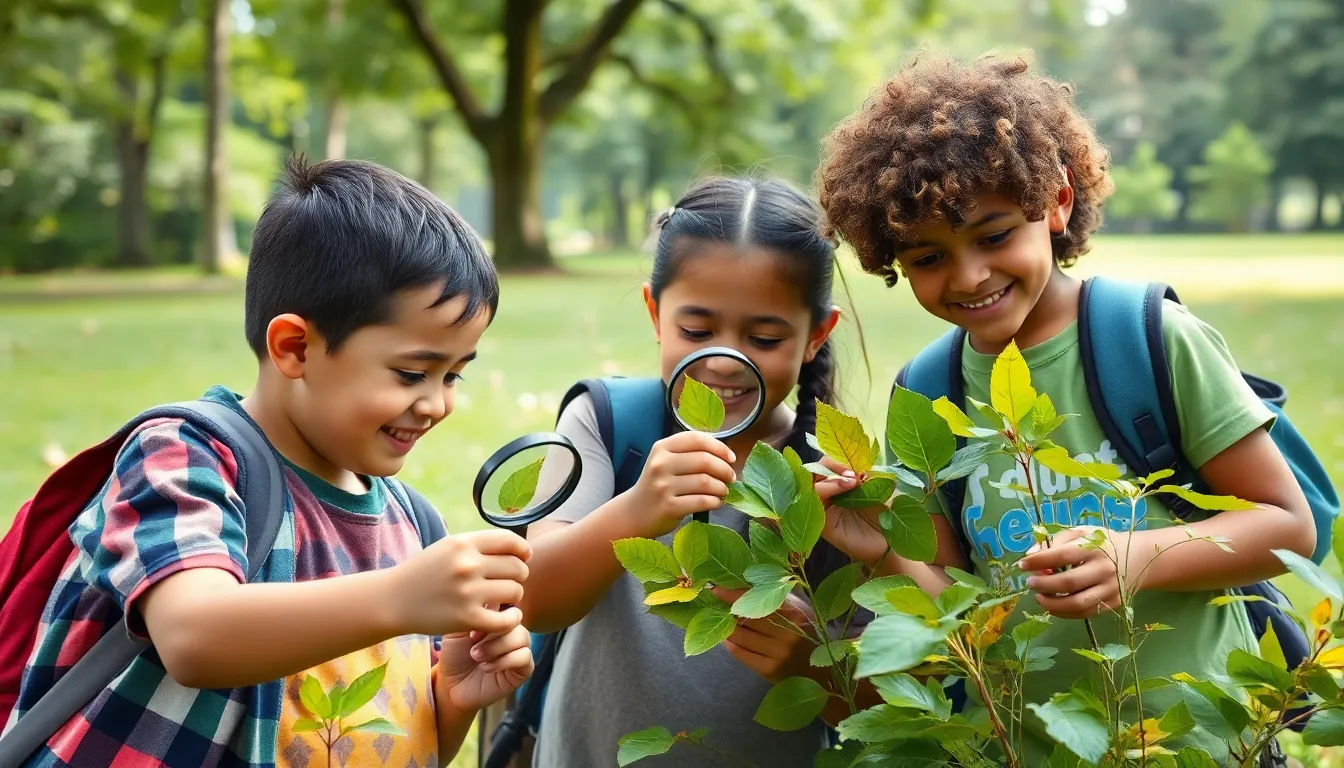In a world where plastic straws are the new villain and recycling bins are the unsung heroes, environmental education activities are stepping into the spotlight. These engaging experiences not only teach the importance of protecting our planet but also transform learning into a fun adventure. Who knew saving the Earth could be as thrilling as a treasure hunt or as satisfying as discovering a secret garden?
Table of Contents
ToggleImportance Of Environmental Education Activities
Environmental education activities foster a deeper understanding of ecological principles. Engaging experiences help individuals recognize their connection to nature. Awareness of environmental issues develops through hands-on participation.
Active involvement in project-based learning promotes critical thinking skills, encouraging individuals to devise solutions to local problems. Effective educational strategies shape responsible citizens who advocate for sustainability.
Statistics indicate that students engaged in environmental programs are more likely to exhibit pro-environmental behaviors. Programs focusing on outdoor exploration cultivate a sense of stewardship for natural resources.
Children exposed to environmental education often show increased engagement in conservation efforts. Understanding the intricate relationships within ecosystems leads to more informed decision-making. This knowledge translates to community initiatives, enhancing collective action for environmental preservation.
Today’s challenges, such as climate change and biodiversity loss, require informed advocates. Programs highlight the significance of maintaining ecological balance, empowering individuals to impact their surroundings positively.
By integrating fun activities with educational goals, participants enjoy learning while developing essential skills. Resources such as local parks and community gardens provide venues for experiential learning. Moreover, collaborative projects encourage teamwork and foster lasting relationships among participants.
Access to quality environmental education activities ensures that individuals from diverse backgrounds can participate. It promotes inclusivity and strengthens community ties. As awareness grows, communities can thrive, creating a healthier planet for future generations.
Types Of Environmental Education Activities

Various environmental education activities exist, enhancing understanding and commitment to sustainability. These activities fall into several key categories.
Outdoor Activities
Outdoor activities connect participants with nature while fostering engagement and skill development. Nature walks invite exploration and observation, allowing individuals to identify local flora and fauna. Wildlife monitoring encourages data collection on animal species, promoting conservation efforts. Cleanup events provide hands-on experience, showing the impact of litter on ecosystems. Gardening initiatives teach sustainable practices, enabling learners to appreciate food sources and biodiversity. These activities increase awareness of environmental issues while reinforcing a sense of responsibility toward the planet.
Classroom Activities
Classroom activities offer structured learning experiences that integrate environmental concepts into curricula. Interactive lessons incorporate discussions on climate change, fostering critical thinking about global challenges. Experiments highlight ecological principles, such as the water cycle and ecosystems’ interdependence. Group projects encourage collaboration, allowing participants to develop innovative solutions for local environmental concerns. Multimedia presentations can engage visual learners, showcasing successful conservation stories. These activities enhance knowledge retention and inspire proactive conservation behaviors.
Community Engagement Activities
Community engagement activities strengthen connections among individuals while promoting environmental stewardship. Workshops educate community members on sustainable practices, such as recycling and energy conservation. Public forums facilitate discussions on local environmental issues, empowering participants to voice their concerns. Volunteering for local conservation organizations provides hands-on experience and fosters teamwork. Collaborative projects, like tree planting or habitat restoration, unify community members around common goals. These initiatives not only enhance environmental awareness but also build resilient and informed communities.
Benefits Of Environmental Education Activities
Environmental education activities provide numerous advantages across various demographics, fostering awareness and action for sustainability.
For Students
Students gain essential skills through environmental education. Engaging with nature enhances their understanding of ecological principles and encourages critical thinking. Participating in hands-on projects fosters teamwork and problem-solving abilities. Research indicates that students involved in environmental programs demonstrate greater pro-environmental behaviors. They also develop a sense of stewardship that encourages lifelong commitment to conservation. With immersive experiences, students actively connect theoretical knowledge to real-world applications. This connection often translates into informed decision-making and increased environmental activism.
For Educators
Educators reap benefits from incorporating environmental education into their curricula. They create dynamic learning environments that stimulate student interest and engagement. Professional development opportunities focus on innovative teaching strategies, enriching the overall educational experience. Teachers often notice improved student participation when lessons include outdoor explorations or project-based activities. These experiences integrate core subjects with environmental concepts seamlessly. Additionally, educators promote inclusivity as environmental education often addresses diverse learning styles. Successful initiatives inspire educators to share effective practices, thus enhancing the teaching community.
For Communities
Communities experience strengthened bonds through environmental education initiatives. Collaborative projects encourage residents to work toward common sustainability goals. Events such as workshops and clean-up activities foster a sense of collective responsibility for local environments. Engagement in these activities increases public awareness of pressing environmental issues. Community partnerships often emerge, leading to lasting connections among residents. Educated citizens advocate for conservation and participate in local governance, actively driving positive change. Increased activism shapes community norms, promoting environmentally friendly practices. Overall, these activities cultivate resilient communities committed to a healthier planet.
Challenges In Implementing Environmental Education Activities
Implementing environmental education activities presents several significant challenges. These obstacles can hinder the delivery and effectiveness of programs aimed at promoting sustainability.
Funding Limitations
Funding constraints pose a major barrier to launching and maintaining environmental education initiatives. Many organizations struggle with securing sufficient financial resources for program development. Grant opportunities may not cover all costs, leaving gaps that limit activity scope. Additionally, small schools and community groups often lack access to funding sources, which restricts their ability to engage in hands-on projects. Limited budgets can result in fewer materials and resources for participants. Consequently, programs may not reach their full potential in fostering a deeper understanding of environmental issues.
Curriculum Integration
Integrating environmental topics into existing curricula can be challenging for educators. Many teachers face pressure to adhere to standardized testing requirements, which may prioritize other subjects over environmental education. Striking a balance between necessary knowledge and engaging, impactful lessons becomes difficult. Furthermore, educators may lack training in environmental issues, leading to a limited understanding of how to teach these concepts effectively. Developing cross-disciplinary lessons that emphasize sustainability takes time and collaboration. Without institutional support, teachers find it harder to incorporate meaningful environmental education into their classrooms.
Environmental education activities play a crucial role in fostering awareness and responsibility toward the planet. By engaging individuals through hands-on experiences and interactive learning, these activities build a strong connection to nature and promote sustainable behaviors. The diverse range of programs not only enhances individual understanding but also strengthens community bonds, creating a collective commitment to environmental stewardship.
Despite challenges like funding and curriculum integration, the benefits of these initiatives far outweigh the obstacles. Investing in environmental education is essential for nurturing informed advocates who will champion sustainability for future generations. As communities embrace these activities, they pave the way for a healthier planet and a more sustainable future.




